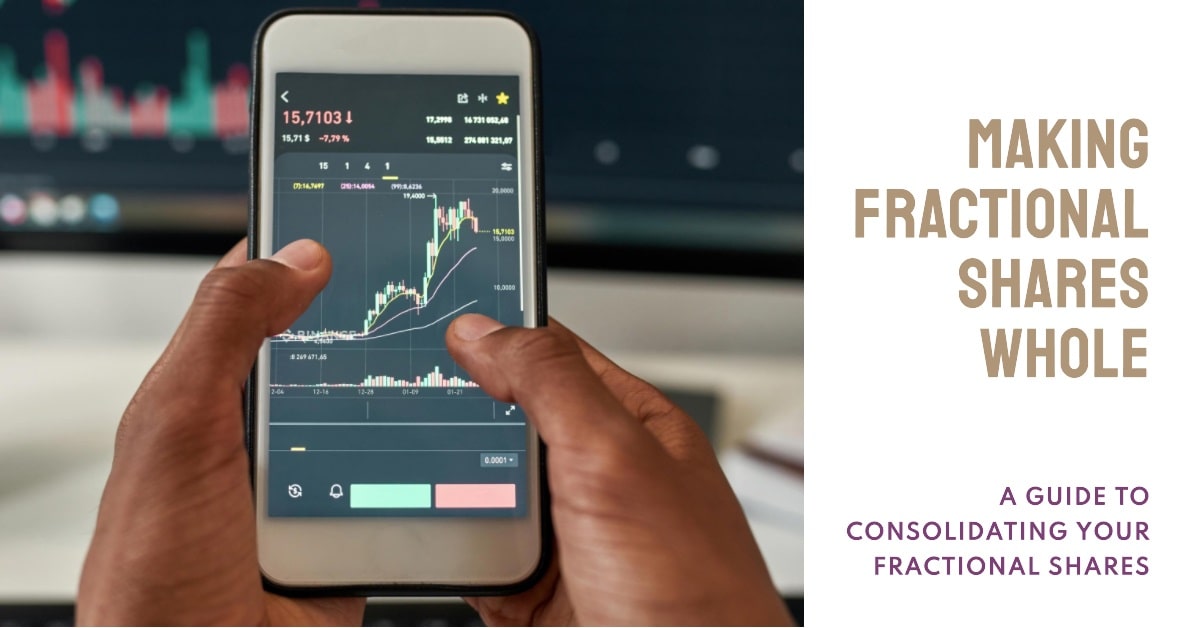Introduction
Investing in the stock market has become increasingly accessible to individuals, thanks to the rise of fractional shares. Fractional shares allow investors to own a portion – or fraction – of a single share, making it possible to invest in high-priced stocks with limited funds. But can these fractional shares ever become whole shares? In this article, we will explore the concept of fractional shares, how they can potentially be converted into whole shares, and the implications of owning fractional shares in the stock market.
What are Fractional Shares?
Fractional shares refer to a portion of a single share of stock. In the past, investors were required to purchase whole shares of stock, which could sometimes be expensive or unaffordable for many people. However, with the rise of fractional share ownership, investors can now own a fraction of a share, making it more accessible and affordable for individuals to invest in stocks.
How Can Fractional Shares Become Whole Shares?
Share Splitting and Allocation
One way that fractional shares can become whole shares is through a process called share splitting or share allocation. This occurs when a company decides to split its shares into smaller units. For example, if a company announces a 2-for-1 stock split, each existing share will be split into two new shares. If you own a fractional share before the split, you will receive additional shares to make up a whole share. This allows investors to maintain their proportional ownership in the company, even after the split.
Stock Dividends
Another way that fractional shares can become whole shares is through stock dividends. When a company declares a dividend, it may choose to distribute additional shares of stock to its shareholders instead of cash. If you own fractional shares, you will receive additional shares as part of the dividend payment. This can help you accumulate enough shares to eventually have a whole share.
Buying Additional Fractional Shares
If you own fractional shares and want to convert them into whole shares, you can also consider buying additional fractional shares. Many brokerages now offer the option to buy and sell fractional shares, allowing you to gradually increase your position until you have a whole share. This can be a convenient way to invest smaller amounts of money while still building a meaningful portfolio.
Buying Whole Shares
Alternatively, if you own fractional shares and want to convert them into whole shares quickly, you can consider buying the remaining shares needed to make up a whole share. This may involve purchasing additional shares on the open market or through a brokerage platform. However, it’s important to consider any transaction fees or commissions that may apply.
Overall, there are several ways that fractional shares can become whole shares. Whether through share splitting, stock dividends, buying additional fractional shares, or purchasing whole shares, investors have options to consolidate their fractional ownership into whole shares. It’s important to consult with your broker or financial advisor to determine the best approach based on your individual investment goals and circumstances.
Pros and Cons of Owning Fractional Shares
Pros of Owning Fractional Shares
Investing in fractional shares provides several advantages:
- Accessibility: Fractional shares make it possible for investors to own a piece of expensive stocks that they may not have been able to afford otherwise. This allows for greater diversification in an investment portfolio.
- Flexibility: Fractional share ownership allows investors to allocate their funds across multiple companies or industries, providing flexibility in their investment strategy.
- Dividend Payments: Owning fractional shares enables investors to receive dividend payments in proportion to their ownership, even if they don’t own a whole share. This allows for potential passive income generation.
- Automatic Reinvestment: Some brokerage firms offer automatic reinvestment of dividends, allowing investors to purchase additional fractional shares with the dividend income.
Cons of Owning Fractional Shares
While fractional share ownership can be advantageous, there are a few drawbacks to consider:
- Limited Voting Rights: In some cases, fractional share owners may not have voting rights in company matters as they hold a fraction of a share. This means they may not be able to participate in important decisions.
- Potential Liquidity Issues: Selling fractional shares can sometimes be more challenging compared to selling whole shares, as there may be limited trading activity for certain companies’ fractional shares.
- Additional Fees: Some brokerage firms may charge additional fees for trading fractional shares. Investors should consider these fees when evaluating the overall cost of owning fractional shares.
Overall, owning fractional shares has its benefits and drawbacks. It’s important for investors to carefully consider their investment goals and risk tolerance before deciding to invest in fractional shares.
How Does Fractional Share Trading Impact the Stock Market?
Fractional Share Trading: A Game Changer for Investors
Fractional share trading has revolutionized the stock market, opening up new opportunities for investors of all sizes. Traditionally, purchasing a single share in a high-priced company might have been out of reach for many individuals. However, with fractional share trading, investors can now own a portion of a share, making it accessible to a wider range of people.
Increased Accessibility and Diversification
One of the major impacts of fractional share trading is the increased accessibility it offers. Investors can now enter the stock market with a smaller amount of capital, as they can purchase fractional shares with a fraction of the share’s price. This allows individuals with limited funds to diversify their portfolios and invest in a broader range of companies.
Liquidating Holdings Made Easier
Fractional share trading also simplifies the process of liquidating holdings. In the past, if an investor wanted to sell a portion of their shares, they were required to sell a whole share. With fractional share trading, investors can sell the exact amount they desire, even if it’s just a fraction of a share. This flexibility allows investors to easily adjust their holdings based on market conditions or personal financial goals.
Influence on Market Volatility
The introduction of fractional share trading has the potential to impact market volatility. As more investors participate in fractional share trading, the overall trading volume may increase. This increased liquidity can lead to smaller bid-ask spreads and reduced price volatility for certain stocks. However, it’s important to note that the impact on market volatility can vary depending on the specific stock being traded and the overall market conditions.
Democratizing Investment Opportunities
Fractional share trading has the potential to democratize investment opportunities by allowing individuals to invest in companies they believe in, regardless of the share price. This can level the playing field and provide access to investment options that were previously limited to high-net-worth individuals or institutional investors. As a result, fractional share trading has the power to empower individual investors and promote financial inclusion.
In conclusion, fractional share trading has changed the landscape of the stock market by making investing more accessible, diversifying portfolios, simplifying liquidation, and potentially impacting market volatility. This innovative approach to investing has opened up new opportunities for individuals looking to invest in the stock market, regardless of their capital constraints. As fractional share trading continues to gain popularity, it is likely to play an increasingly significant role in shaping the future of investing.
How to Convert Fractional Shares into Whole Shares
Consolidate Fractional Shares
One way to convert fractional shares into whole shares is by consolidating your holdings. This involves accumulating enough fractional shares of the same stock to equal a whole share. For example, if you own 0.5 shares of a company, you would need to buy an additional 0.5 shares to make it a whole share. Once you have accumulated enough fractional shares, you can contact your broker and request to consolidate them into whole shares.
Participate in a Share Split
Another way to convert fractional shares into whole shares is by participating in a share split. A share split is when a company decides to divide its existing shares into multiple shares. For example, in a 2-for-1 share split, each existing share is divided into two new shares. If you hold fractional shares before the split, they will be converted into whole shares after the split. This can be a convenient way to convert your fractional shares into whole shares without having to accumulate more shares.
Sell Fractional Shares and Buy Whole Shares
If consolidating fractional shares or participating in a share split is not an option, you can sell your fractional shares and use the proceeds to buy whole shares. This involves selling your fractional shares at the prevailing market price and then using the funds to purchase whole shares of the same or different stocks. Keep in mind that selling fractional shares may involve transaction fees, so be sure to consider this when making your decision.
Utilize Fractional Share Investing Platforms
Some brokerage platforms now offer fractional share investing, which allows you to buy and sell fractional shares directly. If you want to convert your fractional shares into whole shares, you can utilize these platforms to gradually accumulate enough fractional shares to make it a whole share. This method can be convenient as it eliminates the need to consolidate or participate in a share split.
Overall, converting fractional shares into whole shares can be done through consolidation, participating in share splits, selling fractional shares, or utilizing fractional share investing platforms. Each method has its own advantages and considerations, so it’s important to assess your individual circumstances and choose the method that best suits your investment goals.
Conclusion
In conclusion, fractional shares have opened up new possibilities for investors by allowing them to own a portion of a share instead of having to buy a whole share. This has made investing more accessible to a wider range of individuals. While fractional shares themselves cannot become whole shares on their own, there are ways to convert them into whole shares. Investors can choose to accumulate enough fractional shares to reach a whole share, or they can participate in share splitting or stock division initiatives offered by companies.
It is important for investors to consider the pros and cons of owning fractional shares and understand how fractional share trading impacts the stock market before deciding to convert their fractional shares into whole shares. Overall, fractional shares have revolutionized investing and provide investors with more flexibility in their investment strategies.
FinBrain Technologies
www.finbrain.tech
[email protected]
99 Wall St. #2023 New York, NY 10005
Twitter • LinkedIn • Instagram • Facebook


Leave a Reply